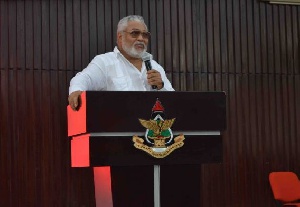Former Ghanaian leader, Jerry John Rawlings, has taken a swipe at people perceived to be behind the recent documentary by Joy News on the chilling account of the murder of three High Court Judges and a retired army officer during the Revolution era.
Mr Rawlings, who particularly believes some politicians just wanted to soil his reputation and make him like a murderer in the eyes of the people, said if he was blood thirsty, the best opportunity to have silenced his critics was in 1979 when the people shouted let the blood flow.
He could not therefore understand why he would be blamed for the murder of the judges in 1982 when things had subsided a bit.
Mr Rawlings’ outburst followed Joy News documentary, “Who killed the judges?” which captured the most horrific account of how three High court judges on June 30, 1982, were abducted, shot and burnt by some soldiers.
The murder of Justices Cecelia Koranteng Addo, Kwadwo Adjei Agyepong, Poku Sarkodie and retired Major Acquah shook the foundation of the country and the judiciary in particular.
They were accused of being corrupt and bias having adjudicated on high profile cases involving the then military governments Armed Forces Revolutionary Council (AFRC) and Provisional National Defence Council (PNDC) all of which had Mr Rawlings as head.
An investigation conducted into the murders by a Special Investigative Bureau (SIB) found Amartei Quaye and others responsible.
Quaye and a few soldiers including Amedeka were to be shot by firing squad but Amedeka broke jail and has since remained a fugitive 36 years on.
The then national security advisor Captain Kojo Tsikata was also named in the investigative report as a “co-conspirator” in the murders but concluded that he, like Amartei Quaye, could not have succeeded in the killing if there was no authorization from a higher authority.
The only higher authority at the time was Flt Lt Jerry John Rawlings who was then the head of state the report concluded.
And the three judges who were murdered, Mr Rawlings has since not officially contested the findings of this report.
When he was invited to appear before the National Reconciliation Commission to tell his side of the story, he refused to heed the call.
When he was subpoenaed to appear before the Commission to come with two audio clips about the murders, he told the commissioners the clips were with a man who had died.
All these accounts were captured in Joy News documentary, which has since reignited the debate about the sad incident of 1982.
But addressing a forum in Kumasi in the Ashanti Region at the weekend, Mr Rawlings insisted he was innocent of the crime.
He said the only guilty persons were the ones who were shot at the Teshie range.
“If I were blood thirsty as these people are claiming on 15th May 79 I could have ignited the thing and left it. 79 when people were calling for blood I could have just let go and let people do the killings.
“How do I come back in the 80s when things have cooled down and say I want to kill judges? It was a terrible thing some of our people did.
How do you choose how to knock me down without going too low?
“I have enough true stories about these characters,” he said.
General News of Tuesday, 16 October 2018
Source: todaygh.com

















